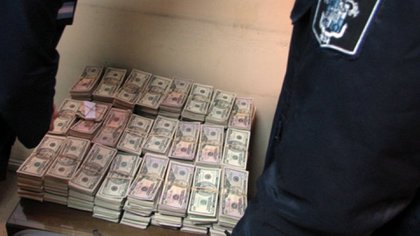Originally published in La Verdad Obrera 247
[Buenos Aires] Thursday 8/16/2007
By Armando Mouzo (Translation by Yosef M.)
They say that a few hours before leaving, the pilots were informed
that there would be eight passengers on the Royal Class flight coming
from Venezuela. The affair of the suitcase of the Venezuelan Antonini
Wilson has acquired a special resonance. Not only because it is in
addition to the Skanska case and to the bag of former Minister Miceli,
stripping bare the corruption of government officials, but because of
the importance that the Bush administration and the domestic right
wing attribute to diplomatic relations between Argentina and
Venezuela. The case has already forced the resignation of the
Argentinean official Claudio Uberti, responsible for deals with
Venezuela and an official of the road franchises control organization
(OCCOVI), as well as [the resignation] of the Venezuelan Diego
Uzcategui Matheus, Vice President of PDVSA, the state oil company of Venezuela. In the first place, the political fraud of Kirchner’s
[current President of Argentina] leadership, that was presented as the
“new politics,” is being unmasked. Just as with Menem [President of
Argentina 1989-1999], the shady deals of privatizations and financial
speculation are the rule; shady deals tied to state investment, with
their respective bribes for political personnel and to the commissions
connected with foreign investment are the characteristic of Kirchner.
These “commission member” politicians go on getting richer, at the
same time that they are collecting for their election campaigns.
Claudio Uberti, a man of Minister De Vido [Julio De Vido, Argentina’s
Minister of Public Works] and a genuine penguin, had in 2006 sent 63%
of the funds from OCCOVI to 4 businesses operating in Santa Cruz and
was a collector of funds for Kirchner’s election campaign in 2003,
charged with selling fishing licenses in exchange for $60,000 US to
finance that campaign.
In the case of the suitcase, the face of the Venezuelan bourgeoisie,
or of its links with foreign capital, also appears. Antonini Wilson, a
millionaire businessman, of dual nationality (Venezuelan and US),
residing in Miami, does business with the “national” oil company
PDDVSA. Not only that, but as was published in several media sources,
Antonini Wilson appears in a picture with Johny Yánez*, the chavista
governor of Cojedes state, with whom he had visited Montevideo last year.
A regime of easily bribed officials
The critics of official bribery all participated in the same corrupt
regime of all these years. López Murphy [Argentinean politician, who ran for Presidency in 2003, finishing third, now an ally of Macri] was a government minister of Banelco, excuse me, of the Alianza. Lavagna
[former Minister of Economy and Production. 2002-2005] was a member of
this government that keeps the privatizations made by Menem, perhaps
the biggest scandal involving corruption and handing over the national
wealth in our history. And as if these scandals were a small matter,
even the corrupt Macri [Buenos Aires politician, elected as head of
city government in BA and an opponent of Kirchner] came out to talk
about honesty. Elisa Carrió** supported the government of de la Rúa,
then resigned, and her “model” was the US, where bribes and corruption
are legal tender. If sectors of the business class complain about
corruption now, it is because bribery seems very expensive to them.
Corruption is the rule in capitalist business, and the inheritance of
all countries, from Argentina to the US, Europe and Japan. The
scandals of this kind are legal tender.
For that reason, there is no other way to end corruption than ending
capitalism, by building a workers’ republic to put an end to the big
looting of the national wealth, that is being squandered from minute
to minute, in favor of enriching a handful of imperialist firms, the
local bourgeoisie, and a caste of corrupt officials. To end this order
of things, it is necessary to nationalize the oil companies, the
energy firms, the telephone companies, to name just a few, without
compensation, under administration by the workers, the only class that
has no part in corruption. In the same way, in order to avoid deals
involving speculation, the banks must be nationalized, to prevent the
flight of foreign currency and make credit serve the interests of
workers and the people.
“What is robbing a bank, compared to founding one?”
This famous sentence from Bertolt Brecht seems appropriate for the
bosses’ opposition that raises its voice from all the media, trying to
set itself up as the “moral reserve of the fatherland.” The radical
Gerardo Morales, Lavagna’s running mate, questions the case of the
suitcase, because it did not go through the usual financial channels,
the banks. But the bankers are the ones who have just made a
corralito***, in Paris, as they did in 2001 in Argentina, swindlers
par excellence. Speculation, usury, and evasion are their doctrine.
Shady business deals involving speculation seem to them to be the
normal field of business, as if they had nothing to do with Menem’s
handing over [of Argentina’s national wealth], with the foreign currency flight during the de La Rúa administration, with the foreign debt. Even the (pro-Castro) banker Heller, who confiscated the savings of depositors, like all the other bankers did, now appears in the ranks of the government, posing as a progressive without blushing. The speculators take away billions of dollars through the “legal channels” of capitalism, money they earned by taking advantage of our high rate of interest, in international terms, thanks to official policy. Without going further, the right-wing “anti-chavista” opposition does not criticize Chávez for participating in financial speculation, by buying Argentinean bonds with the highest market interest rate, in order then to part with them, benefiting his banker friends.
===
[*One interesting thing about Johny Yánez Rangel, governor of Cojedes state, is that on April 12, 2002, Yánez made a declaration accepting Pedro Carmona Estanga, as President. Carmona was “President” of Venezuela for 36 hours, put in office by the military coup that briefly deposed the duly-elected, real President, Hugo Rafael Chávez Frías. This coup was defeated by massive popular resistance, as shown in the superb Irish documentary, The revolution will not be televised. Source: http://www.goear.com/listen.php?v=d4e8446
[**Elisa Carrió was appointed as a prosecutor during the last military dictatorship in Argentina (1976-1983). She finished in fifth place in the 2003 presidential elections and is a candidate for President this year as well. Source: en.wikipedia.org
[***”‘Corralito’ was the informal name for the economic measures
taken in Argentina at the end of 2001 by Minister of Economy Domingo
Cavallo in order to stop a run on the banks, and which were fully in force for one year. The corralito almost completely froze bank accounts and prohibited withdrawals from U.S. dollar-denominated accounts.
[“The corralito caused an immediate backfire on the government. Even
more people started trying to withdraw their money from the banks, and
many ended up in court fighting for their right to have their funds
(and being granted that right on occasion). President Fernando de la
Rúa was forced to resign on 21 December 2001 after violent riots, but
the restrictions of the corralito were not lifted at the time.
[“Argentina’s situation worsened for several months. The corralito was
hardened during the interim rule of President Eduardo Duhalde, and
turned into a corralón (“big corral”). The corralón differed from the corralito in that most deposits were exchanged for a series of
compulsory bonds denominated in pesos. The dollar-denominated accounts
were automatically exchanged by pesos at a predetermined rate. The
real necessity of such a decision was questioned by several observers at the time, and some suggested this move benefited some large companies who were almost broke but whose well-off owners had sent their dollars abroad before the corralito; these owners were thus able to repay their companies’ now devalued debts by a fraction of its original value.
[“The peso was first devalued (from 1.0 to 1.4 pesos/dollar) and then
floated, thereby quickly depreciating to a maximum rate of nearly 4
pesos per dollar.” (From en.wikipedia.org) — YM]











